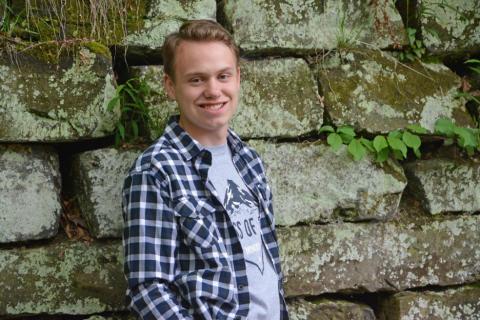Austin Wilson's journey began with a spark of curiosity in his early days in Rocky River, Ohio. His fascination with understanding how things work led him to join his school's Science Olympiad team in middle school and co-found his high school's FIRST Robotics team in his senior year, showcasing his early passion and drive for engineering.
However, even before high school, Wilson’s thirst for knowledge was apparent; he took it upon himself to delve into Arduino, Raspberry Pi, and basic circuitry outside the classroom. After being recognized as an innovative voice developer, he helped write the Amazon Alexa Certification exam in high school. As an Eagle Scout, Wilson developed a passion for adventure and exploration while learning to be resourceful in his daily life. He credits his engineering and adventuring drive to his grandfather, a “creative, resourceful tinkerer, and explorer in his own way.”
Wilson is no stranger to Case Western Reserve University, where he earned a B.S. in Computer Science in 2022 and had some interactions with the Human Fusions Institute during his undergraduate studies. During the COVID-19 pandemic, he assembled two tracking dashboards to map the number of cases, their severity, and vaccinations by geographical location; one that maps the number of cases, their severity, and the number of vaccinations all by geographical location is still used by the Cleveland Department of Public Health.
During his first year at CWRU, he became a software engineer at Structured Monitoring Products (SMP), where he worked as the company's Lead Software Engineer, handling the software as they built the newest version of VetGuardian from scratch. In parallel, Austin worked with several other companies, improving existing human-computer interactions and developing new ones, particularly using augmented and virtual reality, and voice.
After graduating from CWRU, Wilson continued to demonstrate his commitment to his career and future goals. He worked with several startups, including Renalis Health, where he built a modular digital therapeutic system to address issues with the delivery of pelvic health therapies. After SMP was sold to Zomedica, where he now works as a Software Architect and Engineer, Wilson asked himself, 'Am I on a path that my childhood self would be proud of?' This introspection led him to a desire to build technology he hopes to one day use as an astronaut, make choices about hardware/software interactions, and explore means of human/technology interactions beyond a keyboard and mouse. These aspirations led him to join HFI as a graduate student.
Wilson's academic journey will continue at CWRU, where he will pursue his M.S. studies as a member of Assistant Professor Alexis E. Block’s SaPHaRI Lab. To support his ambitions of becoming an astronaut, he collaborated with Block to develop a research plan for his M.S. thesis, which he submitted to the Ohio Space Grant Consortium. His efforts were rewarded with a prestigious fellowship, including a tuition waiver and a $23,400 stipend, to support his M.S. thesis research.
“I am very proud of Austin for his achievement in securing the NASA-funded Ohio Space Grant Consortium Fellowship,” said Block. “I strongly believe in and look forward to executing the research plan we crafted together, and I’m excited for how it will propel him towards his dream of becoming an astronaut.”
Wilson’s M.S. research will focus on a space combining human-computer interaction, human-robot interaction, and psychology. The project aims to provide effective health by assisting isolated and delayed communications crews, such as those in submarines or long-duration space exploration missions. This innovative approach could revolutionize how humans understand and address health in remote environments, sparking hope and excitement for the potential impact of his work.
“I am very excited to join Dr. Block,” said Wilson.


